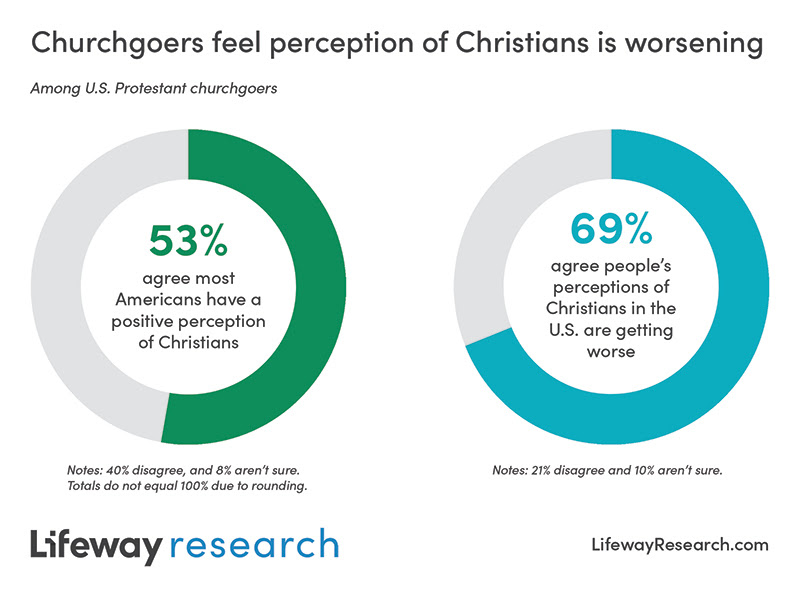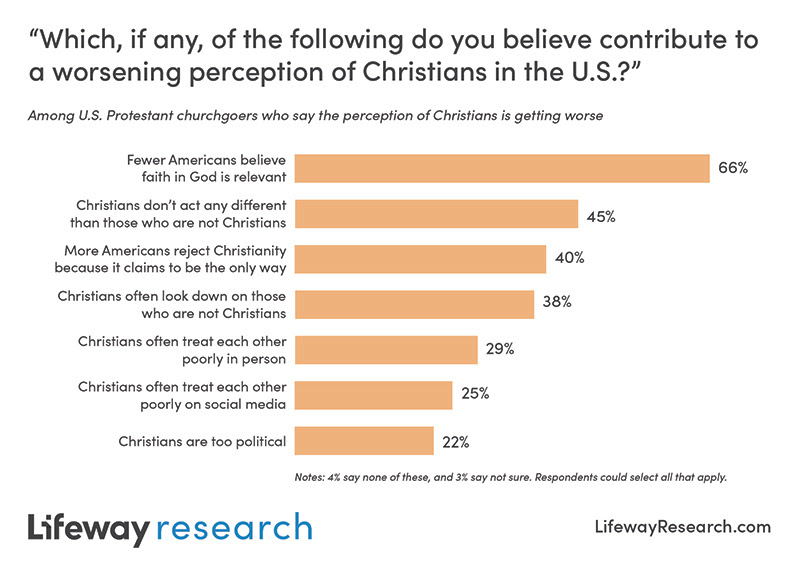Most churchgoers believe Christians have a good reputation with Americans in general, but they worry those feelings are starting to sour.
A Lifeway Research study finds 53% of U.S. Protestant churchgoers say most Americans have a positive perception of Christians. Two in 5 (40%) disagree, and 8% aren't sure.
More consensus exists on the direction public sentiment is headed. Around 7 in 10 (69%) believe people's perceptions of Christians in the U.S. are getting worse, while 21% disagree. Another 10% say they aren't sure.

"The percentage of churchgoers who believe most Americans view Christians positively is remarkably close to a recent national poll indicating 53% of Americans view Christianity favorably," said Scott McConnell, executive director of Lifeway Research. "Though a majority agree, fewer than 1 in 6 churchgoers is strongly convinced most Americans view Christians positively."
Public sentiment
With only a slight majority believing Christians are viewed favorably in the U.S., many demographic groups have differing outlooks on the current reality.
Men are more likely than women to agree that most Americans have a positive perception of Christians (56% v. 49%). Additionally, African Americans (66%) and Hispanics (65%) are more likely to agree than whites (48%) and people of other ethnicities (44%).
Restorationist movement churchgoers (61%) and Baptists (57%) are more likely than those who attend a non-denominational church (45%) to agree most Americans view Christians positively. Churchgoers who aren't evangelicals by belief (5 7%) are also more likely than those with evangelical beliefs (49%) to agree.
On the other side, churchgoers 65 and older (46%) are among the most likely to disagree. Also, those who attend a worship service four times or more a month (43%) are more likely than those who attend one to three times (36%) to disagree that most Americans have a positive perception of Christians.
While 7 in 10 churchgoers believe the public perception of Christians is worsening in the U.S., some groups are more likely than others to see a downward trajectory.
Other ethnicities (84%) are the most likely to say people's perceptions of Christians in the U.S. are getting worse, while whites (71%) are more likely to agree than Hispanics (61%) or African Americans (60%).
Baptists (73%) and non-denominational churchgoers (73%) are more likely to agree than Lutherans (61%). Also, those who attend a worship service four times a month or more (72%) are more likely than those who attend less frequently (65%) to believe the public opinion of Christians is declining. Those with evangelical beliefs (77%) are more likely than those without such beliefs (61%) to agree.
"Surely the small growth in other religions in the U.S. and large numbers of Americans that once called themselves Christians but no longer do impacted churchgoer perceptions," said McConnell. "Not all who left the faith have ill feelings toward Christianity, but indifference is definitely a worse perception than once identifying as one."
Reasons for a reputation decline
Those who believe the public perception of Christians in the U.S. is worsening say responsibility for the decline belongs to both Christians and the rest of America.
Out of seven options that may have contributed to the decline, 75% of churchgoers point to at least one of the two options holding Americans responsible and 71% choose at least one of the five options placing responsibility on Christians. Most blame both, as 53% point to at least one option that places responsibility on Americans and at least one option that faults Christians.
Two in 3 churchgoers (66%) say a reason the public perception of Christians is worsening is because fewer Americans believe faith in God is relevant. Around 2 in 5 point to Christians not acting any different than those who aren't Christians (45%), more Americans rejecting Christianity because it claims to be the only way (40%) and Christians often looking down on those who aren't Christians (38%).
Fewer claim the drop should be credited to Christians often treating each other poorly in person (29%), Christians often treating each other poorly on social media (25%) and Christians being too political (22%). Small percentages say none of these options (4%) or they aren't sure (3%).

"Many churchgoers admit Christians are getting in the way of the message of Jesus Christ," said McConnell. "But if the only reason Christians are not accepted is because people reject the message of Jesus Christ, Christians have already chosen whose approval they desire."
Frequent church attendees are among the most likely to blame Americans. Those who attend a worship service four times or more a month are more likely than those who attend less often to say Christians' worsening public perception is due at least in part to fewer Americans believing faith in God is relevant (70%) and more Americans rejecting Christianity because it claims to be the only way (44%).
Those who attend four times a month or more are less likely than other churchgoers to say the declining perception is due to Christians looking down on those who aren't Christian (32%) and Christians being too political (19%).
Churchgoers in the South are among the most likely to point to Christians treating each other poorly on social media (28%).
White Americans are among the least likely to place blame on Christians being too political (21%). White Americans (70%) and those of other ethnicities (68%) are more likely than African Americans (49%) to say a reason for the declining reputation is that fewer Americans believe faith in God is relevant. For their part, African Americans (47%) are more likely than whites (34%) to point to Christians often looking down on those who are not Christians.
Churchgoers with evangelical beliefs are more likely than other churchgoers to say the decline is because fewer Americans believe faith in God is relevant (71% v. 59%) or because Christians don't act any different than those who are not Christians (48% v. 40%). But those who hold evangelical beliefs are less likely to point to Christians often looking down on those who are not Christians (32% v. 45%) and Christians being too political (17% v. 29%).
For more information, view the complete report and visit LifewayResearch.com.


















